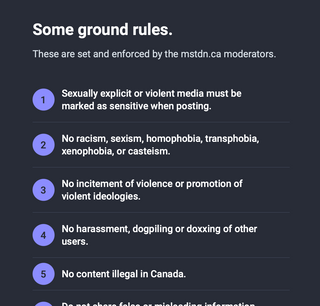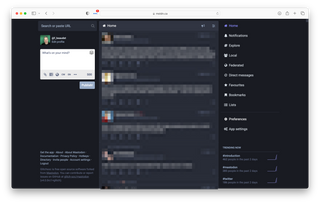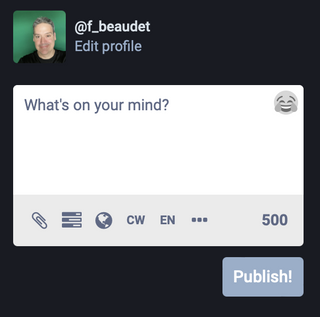A humane guide to Mastodon
Everyone knows this old saying: If you need to expain a joke, it ain't funny. Unfortunately, Mastodon is one of those things that need some explaining. I thought that I could take a shot at an onboarding guide that doesn't require a degree in serverology. Instead, I want to focus on the people that use Mastodon.
In the wake of weird events happening over at The Bird Site, a lot of people are looking for alternatives. Although the name Mastodon has made it into mainstream media the experience of using Masdodon is far from mainstream. Hopefully this is helpful to someone.
Things I will cover:
- The differences with The Bird Site
- Finding a home and getting started
- Basic usage
- Some things I observed after a few weeks
The differences with The Bird Site #
Mastodon is not The Bird Site. It is not meant to replace it, nor does it want to.
Before you even think of joining, know that:
- If you use the bird to get reach, increase engagement, or create a platform for your ideas; you will find that Mastodon will works against you, not for you.
- If you use the bird to follow celebrities, engage with brands, and hear about the latest trends; you will find that this content hasn't moved over and might never move over.
- The pace on Mastodon is a little slower. Things are real-time but not quite. If you use the bird to be up-to-the-minute on everything; it won't work. Mastodon is not the place to try and be the first one to say "earthquake" on the timeline.
- Trust is an issue on the internet in general but it is epecially true when there is a lot of sudden interest in something. There is no "blue check mark" here. Although the blue check mark is a flawed system, it used to be somewhat useful to prevent the worst of the identity problems. There is something similar in Mastodon but it is not as straightforward.
- If you use the bird because you think that free speech is your god-given right and rules impede your freedom. Well, you might find this on Mastodon but I certainly won't help you find it.
Mastodon is not perfect and does have some bad actors in its history. Things have improved but like many things in our culture, it is still difficult for POC and other marginalized folks to feel at home. Social networks are really hard to get right and unfortunately, they are built by technologists instead of people that know anything about sociology, culture, and history. You can't engineer your way out of this kind of problem.
That being said, Mastodon tries really hard and there is a culture of consent associated with many of the interactions that is built-in to the platform. If you are not ok with that, you might find that moving over will not be worth the effort.
Here's what Mastodon has that might be familiar or is worth noting:
- It allows you to post small messages (up to 500 characters) that can be seen by anyone on the Mastodon network. (Don't get scared by words like "server" or "instance"; your posts get across the whole network automatically)
- It allows you to follow other people on the network and organize your followers in lists
- It allows for something that feels a lot like direct messaging. It's not, but it feels a lot like it is.
- It allows you to control better the reach of the things you post. How visible it will be across the network
- It gives you a lot of control over what you see (filters, mute, block)
One last thing before we get started. Mastodon will not suggest posts or people you might be interested in based on topics or your behavior. It will not show you promoted posts or ads. This means that you have to do some work up front to start finding people you know or are insterested in.
If that works for you, let's go!
Finding a home and getting started #
The biggest obstacle to getting started with Mastodon is creating an account. Which is counterintuitive because that's usually the most optimized aspect of any social network.
One of the key differences between Mastodon and The Bird Site is that it is not owned by one company. It is more of a network of people that decide to share the burden of taking care of the infrastructure and the governance of the network. For that reason, your identity in Mastodon looks more like an email address than a simple handle.
For example, my identity on Mastodon is @f_beaudet@mstdn.ca
So, it has two parts:
| @f_beaudet | @mstdn.ca |
|---|---|
| That's me | That's the home that I chose (my server) |
Picking a home is not permanent. If you don't like it, you can pack-up and move. It's tedious and not something you want to do after years of usage because it changes your identity. But you can move and brings your setting and followers with you at any time. That is a feature of the network.
Another thing that is somewhat annoying is that it is way easier to join from a browser than from an app.
If you are in Canada, you are more than welcome to go and create an account at mstdn.ca.
Otherwise, you can go look at this Server List, pick your geographical region and general as the topic. Any open server that is listed there should be good for you to get started. If you want to take some time and shop around for a community that's more aligned with your interests you can do that too.
Once you have chosen a home for your account, the actual account creation is typical of many other places on the web: username, password, confirmation email.
One thing you will notice when you try to create an account is that you will be asked to accept the server's rules. Here's an example:

These rules are like the house rules for the home you chose. Not all servers use the same rules. If you don't agree with those rules and if you break them, you might get blocked or banned from that server.
If you're about to shake your fist at the sky and bitch about rules, know that The Bird Site also has/had rules. You probably clicked accept without reading them. The thing is they don't apply equally to all the people on the site. If you don't like the rules and you still want to join Mastodon, you might have to search for a home that has rules you're ok with.
Ok, I'm in, what now? #

Once you are in, you see an app that should mostly look familiar. I'm not going to write a user guide here but I'm going to talk about the main things that I've heard people struggle with.
In the right hand menu you'll see:
- Home is a reverse chronological view of posts from people or hashtags that you follow + the boosts (retweets) from people you follow. No more, no less.
- Local is a reverse chronological view of all the public posts from people that share the same home as you. Unless you picked your home because of a specific interest or a hyperlocal reason, this feed gets quickly out of hand.
- Federated it is like local but with more. I'm not going to explain this one.
- Favorites and Bookmarks are essentially the same. You get 2 types of likes on Mastodon: Bookmarks that you keep for yourself and Favorites where the original author will be notified. Because there is no algorithm, favorites do nothing to increase the visibility of the post to anyone. They are just a form of feedback between you and the author letting them know that you appreciate what they wrote.
Everything else you can learn in due time or is a familiar concept from other places on the web.
One more thing that I'll point out: The Boost function works like the Retweet feature and it is the only way to increase a post's visibility outside the followers of the original author.

Writing a post should feel familiar if you used to be on The Bird Site. I'll highlight some of the differences:
- The little globe is used to control the visibility of your post. The concepts here are not really intuitive but in time, you'll get the idea.
- You can change the default visibility of your posts in the settings. A lot of people set the default to unlisted and actively change it to public when appropriate.
- The CW is the "content warning" feature. It lets you hide your post behind a word or a phrase so that people that see your post can consent to reading before being shown the content. This is a big cultural change from The Bird Site. My advice here is: experiment, read the room, don't be a jerk. This feature is not about you. It's about other people on the site and they might be very different from you.
- The EN is the language picker. It is considered courteous to let people know what language you wrote your post in.
Some things I observed after a few weeks #
I'm definitely not a Mastodon veteran. But as a newcomer from The Bird Site, here are a few things I learned.
Quote Tweets #
There is no quote tweet on Mastodon. This is by design. On The Bird Site it drives a lot of toxic behavior. Quote tweeting is used to talk about someone instead of talking to someone.
In the same vein, copy/pasting or screenshoting what someone else wrote and talking about it is frowned upon. Some communities actually forbid it.
Search is very different #
Search in Mastodon only searches very specific things like users and hashtags. You cannot use search like on The Bird Site to find people that talk about "Elon Musk" and go with your friends to defend your favorite billionaire in a conversation that you're not involved in.
This is why you rarely see words being bowdlerized to avoid being picked up in search. Discovery is opt-in.
Instead of typing p3tun1as in your post to avoid being dogpiled by fans of begonias, you write it normally and they can't find you in search. It you want people to discover your post, you use #petunias and it will appear in search.
Read more about the Mastodon culture #
Be open to learning the culture once you join. Listen and be open to learning new ways of doing things. I found it a very rewarding experience.
Yes, people on Mastodon like to refer to Twitter as The Bird Site. It is a lot like saying That Scottish play.
How Mastodon search works and why
Home invasion : Mastodon's Eternal September begins
Mastodon Post about Mastodon etiquette
There's also a lot to discover about the experience of POC or LGBTQ folks on this platform. As an old white cis guy, I will step aside and let them tell the story. The only thing I can do is amplify their voices.
Just know that, while the Mastodon software itself was mostly built by a white dude from Germany; the community was shaped by people that are not straight white men. I think that you will find that it brings a whole new approach to social media. Something that is hopefully more inclusive and respectful.